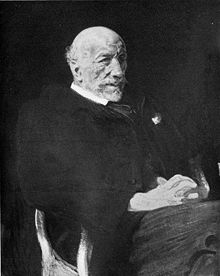Carl Justi
Appearance

Carl Justi (2 August 1832, in Marburg – 9 December 1912, in Bonn) was a German art historian,[1] who practised a biographical approach to art history. Professor of art history at the University of Bonn, he wrote three major critical biographies: of Johann Joachim Winckelmann, of Diego Velázquez and of Michelangelo.
Life
Born in Marburg, Justi studied theology at the University of Berlin before transferring to philosophy. He graduated in 1859 with a thesis 'Über die ästhetischen Elemente in der platonischen Philosophie'.[2]
Justi established his reputation with a three-volume work on Johann Joachim Winckelmann. [3] He succeeded Anton Springer in the chair of art history at the University of Bonn,[4] holding the post from 1872 until 1901.
Works
- Die ästhetischen Elemente in der platonischen Philosophie: ein historisch-philosophischer Versuch, Marburg: N. G. Elwert, 1860
- Winckelmann: sein Leben, Seine Werke und sein Zeitgenossen. 3 vols. Leipzig: F. C. W. Vogel, 1866–72.[5]
- Diego Velázquez und sein Jahrhundert. Bonn: M. Cohen, 1888. Translated into English as Diego Velázquez and His Times. London: H. Grevel, 1889.
- Michelangelo: Beiträge zur Erklärung der Werke und des Menschen. Leipzig: Breitkopf & Härtel, 1900
References
- ^ Carl Justi de.Wikisource (bibliography)
- ^ Udo Kultermann (1993). The history of art history. Abaris Books. p. 128. ISBN 978-0-89835-055-5. Retrieved 7 May 2012.
- ^ Peter A. Lawless; University of Michigan (2009). The Nomad Past: German Histories, Italian Journeys, and the Visible Texture of Time. p. 241. ISBN 978-1-109-11651-9. Retrieved 7 May 2012.
- ^ William Musgrave Calder (1984). Studies in the modern history of classical scholarship. Jovene Editore. p. 161. Retrieved 7 May 2012.
- ^ "Review of Winckelmann by Carl Justi". The Quarterly Review. 136: 1–55. January 1874.
External links
- Carl Justi at the Dictionary of Art Historians
